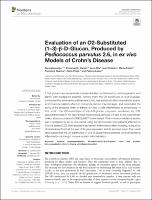Evaluation of an O2-Substituted (1–3)-β-D-Glucan, Produced by Pediococcus parvulus 2.6, in ex vivo Models of Crohn’s Disease
Autor
Fecha
2021-02-05Enlace permanente
https://hdl.handle.net/11351/6068DOI
10.3389/fmicb.2021.621280
ISSN
1664-302X
WOS
000619456100001
PMID
33613490
Palabras clave
Efecto antiinflamatorio de la enfermedad de Crohn; Inmunomodulacion; Exopolisacáridos bacterianosCitación recomendada
Notararigo S, Varela E, Otal A, Cristobo I, Antolín M, Guarner F, et al. Evaluation of an O2-Substituted (1–3)-β-D-Glucan, Produced by Pediococcus parvulus 2.6, in ex vivo Models of Crohn’s Disease. Front Microbiol. 2021 Feb 5;12:621280.
Audiencia
Professionals
Este elemento aparece en las siguientes colecciones
- HVH - Articles científics [4471]
- VHIR - Articles científics [1751]
El ítem tiene asociados los siguientes ficheros de licencia:

 Área privada
Área privada Contacto
Contacto








